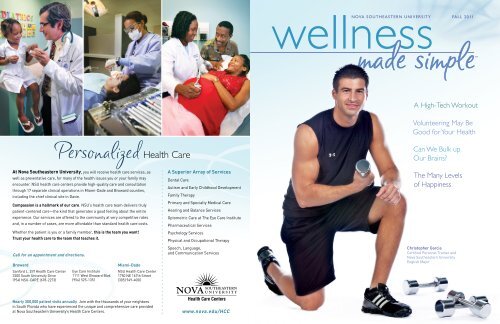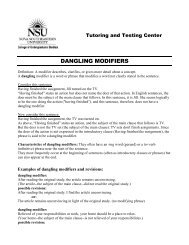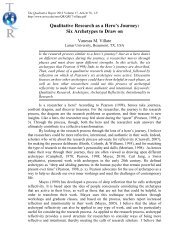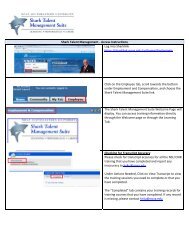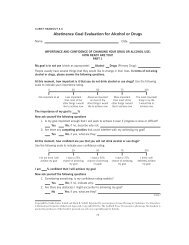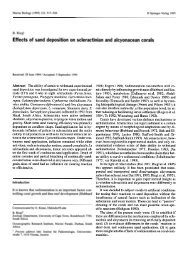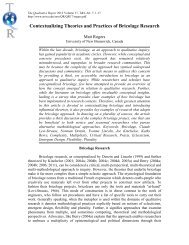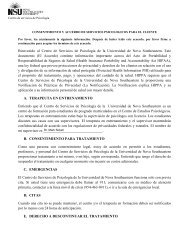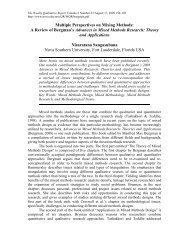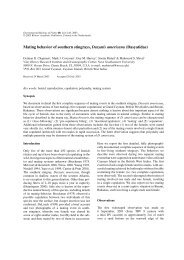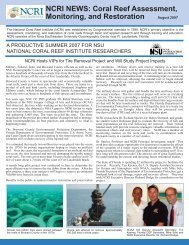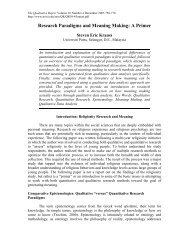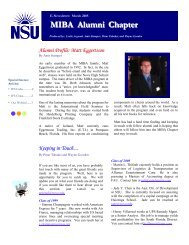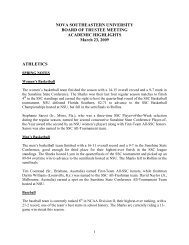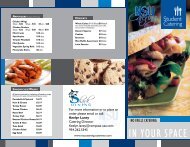Can We Bulk up - Nova Southeastern University
Can We Bulk up - Nova Southeastern University
Can We Bulk up - Nova Southeastern University
Create successful ePaper yourself
Turn your PDF publications into a flip-book with our unique Google optimized e-Paper software.
At <strong>Nova</strong> <strong>Southeastern</strong> <strong>University</strong>, you will receive health care services, as<br />
well as preventative care, for many of the health issues you or your family may<br />
encounter. NSU health care centers provide high-quality care and consultation<br />
through 17 separate clinical operations in Miami-Dade and Broward counties,<br />
including the chief clinical site in Davie.<br />
Call for an appointment and directions.<br />
Broward<br />
Sanford L. Ziff Health Care Center<br />
3200 South <strong>University</strong> Drive<br />
(954) NSU-CARE (678-2273)<br />
Personalized Health Care<br />
Compassion is a hallmark of our care. NSU’s health care team delivers truly<br />
patient-centered care—the kind that generates a good feeling about the entire<br />
experience. Our services are offered to the community at very competitive rates<br />
and, in a number of cases, are more affordable than standard health care costs.<br />
Whether the patient is you or a family member, this is the team you want!<br />
Trust your health care to the team that teaches it.<br />
Eye Care Institute<br />
1111 <strong>We</strong>st Broward Blvd.<br />
(954) 525-1351<br />
Miami-Dade<br />
NSU Health Care Center<br />
1750 NE 167th Street<br />
(305) 949-4000<br />
A S<strong>up</strong>erior Array of Services<br />
Dental Care<br />
Autism and Early Childhood Development<br />
Family Therapy<br />
Primary and Specialty Medical Care<br />
Hearing and Balance Services<br />
Optometric Care at The Eye Care Institute<br />
Pharmaceutical Services<br />
Psychology Services<br />
Physical and Occ<strong>up</strong>ational Therapy<br />
Speech, Language,<br />
and Communication Services<br />
Nearly 300,000 patient visits annually. Join with the thousands of your neighbors<br />
in South Florida who have experienced the unique and comprehensive care provided<br />
at <strong>Nova</strong> <strong>Southeastern</strong> <strong>University</strong>’s Health Care Centers. www.nova.edu/HCC<br />
wellness<br />
NOVA SOUTHEASTERN UNIVERSITY FALL 2011<br />
made simpleTM<br />
A High-Tech Workout<br />
Volunteering May Be<br />
Good for Your Health<br />
<strong>Can</strong> <strong>We</strong> <strong>Bulk</strong> <strong>up</strong><br />
Our Brains?<br />
The Many Levels<br />
of Happiness<br />
Christopher Garcia<br />
Certified Personal Trainer and<br />
<strong>Nova</strong> <strong>Southeastern</strong> <strong>University</strong><br />
English Major
Table of<br />
Contents<br />
16<br />
6<br />
10<br />
22<br />
20<br />
28<br />
F<br />
eatures<br />
6<br />
10<br />
14<br />
D<br />
A High-Tech Workout<br />
Volunteering May Be Good for Your Health<br />
The Six Dimensions of <strong>We</strong>llness<br />
16<br />
20<br />
22<br />
24<br />
26<br />
28<br />
32<br />
34<br />
Emotional<br />
Emotional Hunger: What's Eating You?<br />
Intellectual<br />
<strong>Can</strong> <strong>We</strong> <strong>Bulk</strong> Up Our Brains?<br />
Occ<strong>up</strong>ational<br />
The Many Levels of Happiness<br />
Physical<br />
A Rocking Workout<br />
Social<br />
Fifteen Pounds of Freshman Reality<br />
Spiritual<br />
Faith Gives Athletes Peace of Mind<br />
epartments<br />
Health and <strong>We</strong>llness<br />
Initiatives<br />
NSU <strong>We</strong>llness Calendar<br />
wellness<br />
made simple<br />
is produced by the <strong>Nova</strong> <strong>Southeastern</strong><br />
<strong>University</strong> Office of Publications<br />
35<br />
36<br />
<strong>We</strong>llness Resources<br />
What’s at NSU for You
To NSU Family<br />
Members and Friends: Editors’ Note<br />
<strong>We</strong>lcome to the third edition of our award-winning wellness magazine, <strong>We</strong>llness Made Simple.<br />
This issue will once again focus on articles written by our <strong>Nova</strong> <strong>Southeastern</strong> <strong>University</strong> family that promote healthy<br />
lifestyles, while spotlighting the vast array of health resources provided by the university to our students and faculty and<br />
staff members. <strong>We</strong> are proud of the university’s commitment to promoting a healthy and caring environment on campus.<br />
<strong>We</strong>llness Made Simple aims to provide the NSU family with the latest health information to enrich their lives. <strong>We</strong> strive to<br />
provide stories with pragmatic knowledge that readers can apply to their own lives, furthering their health and wellness<br />
goals. <strong>We</strong> hope to stimulate discussions on current and future health and wellness initiatives.<br />
Be on the lookout for <strong>up</strong>coming new programs to address the health care needs of our NSU staff. For those that have<br />
insurance plans with the Independent Colleges and Universities Benefits Association (ICUBA), keep an eye out for our<br />
<strong>We</strong>llness Made Simple program through our medical centers. A pilot program is being conducted in conjunction with<br />
ICUBA and Blue Cross/Blue Shield of Florida to provide health care services at our NSU Health Care Centers without<br />
charging patients a deductible or co-payment. There will be no out-of-pocket payments. Additionally, there will<br />
continue to be no co-payments for generic drugs at the NSU pharmacy, which is also located at the Health Care<br />
Centers. <strong>We</strong> are striving to provide more affordable health care.<br />
<strong>We</strong> are also in the midst of completing our transition to electronic health care records. This advanced, computerized<br />
system will allow our health care providers to access information quickly and reduce medical errors associated with<br />
paper records. The speed and accuracy of this system will help us provide better health care.<br />
Finally, we would like to thank the sponsors of NSU health and wellness events as well as <strong>We</strong>llness Made<br />
Simple. A special thanks goes out to Blue Cross/Blue Shield of Florida for their generous s<strong>up</strong>port of all our<br />
programs for the past four years. Please acknowledge all of our partners with your s<strong>up</strong>port and thanks<br />
when you see their representative at our many NSU events.<br />
This magazine is written by our students and faculty and staff members, who have a wealth of<br />
knowledge and experience with health and wellness. They wrote about the six different dimensions<br />
of wellness to achieve healthier lifestyles.<br />
Enjoy our latest edition. And as always, we welcome your feedback.<br />
Sincerely,<br />
2<br />
wellness<br />
made simple<br />
Robert S. Oller, D.O.<br />
Publisher<br />
Chief Executive Officer, Division of Clinical Operations<br />
Professor of Family Medicine, College of Osteopathic Medicine<br />
The 2011 issue of <strong>We</strong>llness Made Simple will show you how a healthier lifestyle can be achieved<br />
by anyone, no matter what condition you are in and where you are in life. The magazine delivers a balanced<br />
approach to help you reach your wellness goals through our six dimensions of wellness: social,<br />
occ<strong>up</strong>ational, spiritual, physical, intellectual, and emotional.<br />
Our latest issue comes off the heels of our award-winning 2010 issue. That issue won two prestigious awards<br />
in an international writing and design competition. It took home two Communicator Awards given by the<br />
International Academy of the Visual Arts: a Gold Communicator Award for feature writing and a<br />
Silver Communicator Award for interior design.<br />
<strong>We</strong> would like to thank our designer Randy McCafferty from <strong>Nova</strong> <strong>Southeastern</strong> <strong>University</strong>’s Office of<br />
Publications, freelancer photographer Bob Eighmie, and all our gifted writers for their hard work and talents in<br />
making these awards possible.<br />
In this edition, we challenge you to take control of your own health and wellness by bringing you articles<br />
such as the benefits of playing the Nintendo Wii, how volunteering can change your life, the powerful effects of<br />
music in a workout, how to build your intelligence quotient, shedding the dreaded freshman 15, controlling your<br />
emotional eating, and much more.<br />
As always, <strong>We</strong>llness Made Simple brings you all the latest health and wellness tips and events for you<br />
to enjoy as a member of the NSU family. <strong>We</strong> are fortunate to work at a university that promotes wellness and<br />
provides a vast array of resources to back it <strong>up</strong>.<br />
The university has everything from the NSU Biggest Loser challenge and the NSU Employee Health Fair, to<br />
A Day for Children and the Shark Shuffle 5k Run/Walk, just to name a few. <strong>We</strong> invite you to take advantage<br />
of these activities designed to foster healthier lifestyles. Please don’t forget to use the<br />
university’s resources, including our health care centers, RecPlex fitness center, Sports Medicine<br />
Clinic, campus recreation, and student counseling.<br />
As your managing editors, we want to challenge you to be a champion of wellness.<br />
As you achieve your wellness goals, please spread the word and get others<br />
involved. The gift of health and wellness will better the lives of your family,<br />
friends, acquaintances, and coworkers.<br />
If you want to be a happier and more productive student or<br />
faculty or staff member, you will need to build a healthier body and mind.<br />
It’s easy to start. Just flip through the pages of <strong>We</strong>llness Made Simple,<br />
consume the content, and use it. Don’t just let life pass you by.<br />
Be well!<br />
Ken Ma Signature Marcela Sandigo Signature<br />
Ken Ma, M.B.A.<br />
Managing Editor<br />
NSU Associate Director<br />
of Public Affairs<br />
Marcela Sandigo, M.B.A.<br />
Managing Editor<br />
NSU Associate Director<br />
of Campus Recreation
Contributors<br />
Yineth Sanchez<br />
As a junior at NSU majoring<br />
in legal studies and philosophy,<br />
I am used to seeing peers<br />
adhere to all kinds of energy<br />
boosters in order to get<br />
through their days. For me,<br />
a few spoons of laughter are<br />
my caffeine for the day. Once<br />
I step outside my house, I make<br />
a personal commitment to<br />
enjoy my day and find as many<br />
reasons as I can to be joyous.<br />
Casey Elise Zagaria, M.B.A.<br />
I am a doctoral student at<br />
NSU’s Abraham S. Fischler<br />
School of Education and the<br />
associate director of NSU’s<br />
Alumni Association. Like a<br />
hummingbird, I’m always<br />
moving—whether it’s dancing<br />
in the club, diving in the ocean,<br />
or navigating the mixed martial<br />
arts workout on my Kinect.<br />
I get bored easily, so variation<br />
is the key to my nutrition and<br />
fitness. Do I sleep? Sometimes.<br />
If you would like to be a contributor for the next issue,<br />
please contact Marcela Sandigo at (954) 262-7018.<br />
Annarely Rodriguez<br />
I graduated from NSU in spring<br />
2011 with a bachelor's degree<br />
in communication studies. I was<br />
a former news editor at NSU’s<br />
newspaper, The Current. Looking<br />
for a job as a recent graduate<br />
is stressful, so I relax with yoga<br />
every morning. It helps to keep<br />
me fit and to stay relaxed at<br />
the same time. I also try not<br />
to underestimate the value<br />
of eating right.<br />
Linda Maurice<br />
I am the director of NSU’s Lifelong<br />
Learning Institute in the College<br />
of Osteopathic Medicine. For<br />
the last 25 years, I have been a<br />
wife, mother, and career woman.<br />
Whether it was trudging through<br />
the Middle East on television news<br />
assignments; representing the<br />
Lifelong Learning Institute; or<br />
managing the lives of three busy<br />
children, I attribute my daily sanity<br />
to regular exercise. Better than<br />
caffeine, it’s a no-fail cure for my<br />
morning, soporific trance!<br />
Randy Heller<br />
Ph.D., LMFT, LMHC<br />
I am a psychotherapist in private<br />
practice in Davie and an adjunct<br />
faculty member in the Department<br />
of Family Therapy at NSU’s<br />
Graduate School of Humanities<br />
and Social Sciences. I find myself<br />
the happiest when I am pursuing<br />
my dreams both in my personal<br />
and professional life, and am<br />
grateful for the opportunities to<br />
do so. My 21-year-old daughter<br />
is my greatest passion and source<br />
of inspiration.<br />
Christopher Garcia<br />
I am a senior double majoring in<br />
English and international studies<br />
at NSU’s Farquhar College of Arts<br />
and Sciences. I am also the editor<br />
in chief of the college’s literary<br />
magazine, Digressions. As a<br />
personal trainer at NSU’s RecPlex,<br />
I choose to lead by example when<br />
it comes to wellness. I try to stay<br />
in peak physical condition through<br />
exercise and nutrition. Whether<br />
it is mountain biking with my little<br />
brother or running an obstacle<br />
course marathon dressed as a<br />
s<strong>up</strong>erhero, the key is having fun.<br />
Arlene Brett Gordon<br />
Ph.D., LMFT<br />
I am the director of the Brief Therapy Institute at NSU’s Graduate<br />
School of Humanities and Social Sciences. I’ve made good use<br />
of the spectrum of health practices. As a result, nothing is<br />
alternative medicine to me. Natural remedies, yoga, meditation,<br />
regular check<strong>up</strong>s, and daily walks are essential for me. Having<br />
a job that keeps me on the move, instead of sitting at my desk<br />
all day, also helps.<br />
Richard Toumey, M.F.A.<br />
I am an adjunct professor of writing in the master’s degree<br />
program in cross-disciplinary studies at NSU’s Graduate School<br />
of Humanities and Social Sciences. Writing gets too sedentary<br />
and stressful, so I walk whenever I can. As a beneficiary of<br />
everything from orthopedic surgery to spiritual healing,<br />
I’ve learned that good health takes daily attention. Meditation<br />
is central to my fitness. The healthiest thing I do, probably,<br />
is keep the company of inspiring people.<br />
5
high-tech<br />
workout<br />
that really breaks<br />
a sweat<br />
Sweat runs down your back, and your heart beats quickly as<br />
your racket makes contact with the ball. The referee announces your<br />
triumph: 6-love—a personal record in your tennis-playing experience.<br />
6<br />
wellness<br />
made simple<br />
A<br />
By Annarely Rodriguez<br />
Christine Sacramento and Taurence Postell<br />
NSU Undergraduate Students<br />
You crash on your couch. It was a good workout.<br />
It was a different workout, though, because instead<br />
of using a racket, you used a controller.<br />
7
The way people work out today is changing due<br />
to recent videogame consoles such as the Nintendo<br />
Wii. Although it’s a new way to work out, is the Wii a<br />
substitute for the good old fashioned sweat and toil<br />
of the gym? Or could the Wii be a good complement<br />
to the gym and traditional physical workouts and<br />
athletic activities?<br />
When the Wii was introduced in November 2006,<br />
it became Nintendo’s most revolutionary game console.<br />
It included WiFi capabilities, blue-tooth, and wireless<br />
motion-sensitive remotes—high-tech stuff for<br />
a videogame.<br />
The console sold out for months due to its affordability<br />
($250) compared to other consoles. Its popularity,<br />
as well as its price, has not changed since.<br />
When you buy a new console, it comes with a copy of<br />
Wii Sports that includes tennis, baseball, golf, and<br />
bowling. These are videogame sports that simulate<br />
the actions of real sports, but using a controller<br />
instead of actual athletic equipment or playing on<br />
the field.<br />
The console was so popular that, four years after its<br />
release, Nintendo’s rival, Xbox, released the Kinect,<br />
which takes the Wii a step further by getting rid of the<br />
controllers and responding to the players’ movements<br />
through a camera.<br />
Beric Berlioz, sophomore biology major at <strong>Nova</strong><br />
<strong>Southeastern</strong> <strong>University</strong>’s Farquhar College of Arts<br />
and Sciences, said he used to be a big computer<br />
gamer. He discovered that the Wii was more userfriendly<br />
but less challenging than other consoles.<br />
“It has a more elementary game style and playing,”<br />
he said. “It’s more children-friendly, but not as technical<br />
or strategic as other games like Halo in Xbox live.<br />
There’s a different level of thinking required.”<br />
Two years after the Wii console came out, Nintendo<br />
released the Wii Fit. Released in May 2008, the<br />
console includes a control in the form of a board<br />
on which players can stand as they play the games.<br />
8 wellness made simple<br />
With the new platform, the company released games<br />
such as yoga, skiing, and other balance games.<br />
Brian Andriani, senior history major at the Farquhar<br />
College of Arts and Sciences, said he thought the<br />
sport games were fun. He said playing tennis on the<br />
Wii was realistic. However, he said playing baseball<br />
on the Wii was very different than playing in real life.<br />
Tina Rando, a junior biology major at the Farquhar<br />
College of Arts and Sciences, agreed. “It depends<br />
on the game, but if you like to play sports, it doesn’t<br />
compare,” she said.<br />
When you buy a new console,<br />
it comes with a copy of Wii<br />
Sports that includes tennis,<br />
baseball, golf, and bowling.<br />
These are videogame sports<br />
that simulate the actions of<br />
real sports…<br />
Playing the game at home also takes away the<br />
interaction with other people that could result from<br />
playing at the park, a basketball court, or the gym.<br />
“At the gym, you get to interact with people that you<br />
don't interact with at home,” said Joe Jones, a senior<br />
exercise science major at the Farquhar College of Arts<br />
and Sciences. “There are a lot more opportunities<br />
[to meet new people] at the gym.”<br />
When the Wii was first introduced, it revolutionized<br />
the videogame industry because it was the first<br />
home videogame console that physically engaged<br />
the player. This presented the opportunity to create<br />
games differently and make the user interact with<br />
the game even more.<br />
But while NSU students think the console is fun, many<br />
do not consider it a substitute to traditional workouts.<br />
“Personally, I still need to go to the gym, but I guess<br />
[the Wii] is a good way to precondition or to have extra<br />
cardio at home,” Jones said.<br />
Andriani said he believes it’s a good cardio workout<br />
for people who may not regularly work out.<br />
Andrew Kusienski, D.O., department chair of sports<br />
medicine at NSU’s College of Osteopathic Medicine,<br />
agreed. He said that if students have no other option<br />
or time to exercise at the gym, the Wii is better than<br />
not working out at all.<br />
However, he said that although the Wii is being used<br />
in rehabilitation by physical therapists and certified<br />
athletic trainers, from a medical standpoint, he does<br />
not recommend people work out using the Wii.<br />
“From my standpoint, you are going to burn more<br />
calories and get your heart rate higher with traditional<br />
exercise, which is better for both general health and<br />
weight loss,” he said.<br />
Kusienski added that working out using the Wii is not<br />
as intense as working out at the gym.<br />
“There was a study that compared the Wii, traditional<br />
gaming, and walking on a treadmill. The study<br />
showed that walking on a treadmill raised your<br />
heartbeat higher than using the Wii by far,” he said.<br />
Jones said that he preferred working out at the gym<br />
because the Wii offers a general work out. “At the<br />
gym you have varying exercises, and you can isolate<br />
the muscles you want to work on,” he said.<br />
Most popular Wii games in 2010<br />
(according to www.1<strong>up</strong>.com)<br />
Although the Wii engages the user more than<br />
the other Nintendo consoles, the most popular<br />
games available in the console are reminiscent<br />
of those available in its predecessors. They are<br />
not games that necessarily take advantage of<br />
the new technology.<br />
1. S<strong>up</strong>er Mario Galaxy 2<br />
2. Epic Mickey<br />
3. Metroid: Other M<br />
4. No More Heroes 2: Desperate Struggle<br />
5. Red Steel 2<br />
9
10<br />
wellness<br />
made simple<br />
NSU's A Day for Children<br />
Health Fair<br />
Everyone—senior citizens, young people, families, and singles—<br />
is doing it these days. Experts say it is even good for us.<br />
So, what is grabbing everyone’s attention?<br />
Volunteering<br />
V May Be Good for Your Health<br />
Since colonial times, there has been a<br />
spirit of philanthropy in America. From way back then<br />
until present day, people have banded together to help<br />
each other as a survival mechanism. Whether it was in<br />
the wilds of the new American colonies or during the<br />
devastating aftermaths of the September 11 terrorist<br />
attacks, Hurricane Katrina, or other disasters, Americans<br />
have extended themselves to help strangers or their<br />
own communities out of an inherent need to do the<br />
right thing.<br />
This sense of volunteerism is alive and well at <strong>Nova</strong><br />
<strong>Southeastern</strong> <strong>University</strong>. NSU volunteers—students<br />
and faculty and staff members—give of their time and<br />
expertise, like other volunteers, without expectation of<br />
financial gain or any other kind of reward.<br />
According to George L. Hanbury II, Ph.D., NSU president,<br />
a spirit of volunteerism is what enables NSU to stand<br />
out among other academic institutions.<br />
“Our mission of sincere volunteerism is what makes<br />
NSU a unique and strong presence in this community,”<br />
Hanbury said. “You can’t have successful academic<br />
programs without an infusion of enthusiastic, altruistic<br />
community spirit and engagement.”<br />
By Linda E. Maurice<br />
While most of our day-to-day lives are filled with the<br />
things we “must” do, volunteering is something that is<br />
generally not required, but rather something we give<br />
of ourselves just for the sake of giving and doing. And,<br />
it turns out, that good feeling we get from extending<br />
ourselves without receipt of any gain has benefits.<br />
According to a research study by Carol D. Ryff, Ph.D.,<br />
author of Happiness Is Everything, or Is It? Explorations<br />
on the Meaning of Psychological <strong>We</strong>ll-Being, happiness<br />
is related to our experiences of what is known as<br />
psychological well-being. This, in turn, has six critical<br />
components, with volunteering possibly affecting<br />
many of them. These six components are having a<br />
purpose in life, having goals, feeling socially connected,<br />
having a degree of self-acceptance, autonomy, and<br />
environmental mastery.<br />
Barry Nierenberg, Ph.D., associate professor at NSU’s<br />
Center for Psychological Studies, believes that Ryff’s components<br />
can be directly applied to how volunteerism might<br />
significantly increase a person’s mental and physical<br />
well-being and improve his or her sense of happiness.<br />
“You could easily see, for a selected individual, how many<br />
of Ryff’s six components could be s<strong>up</strong>ported by<br />
11
Volunteering—it can certainly give you a purpose and<br />
goal in your life, help you feel connected to others in a<br />
socially meaningful way, and assist you in fully accepting<br />
yourself with your own unique blend of strengths<br />
and weaknesses,” Nierenberg said. “Ryff’s components<br />
can also assist you in feeling you have increased environmental<br />
mastery—that you need to get to where<br />
you are going to volunteer, need to navigate the system,<br />
and help those you are volunteering to help, etc.”<br />
At NSU, students and faculty and staff members are<br />
encouraged to get involved in the university and the<br />
outside community at large. With faculty members,<br />
Hanbury stresses his top three requirements: teaching,<br />
research, and service.<br />
The university recently received the prestigious 2010<br />
Community Engagement Classification from the<br />
Carnegie Foundation in recognition of NSU’s significant<br />
commitment to and demonstration of community<br />
engagement.<br />
“NSU’s spirit of volunteerism is well-documented<br />
and well-received in the community,” said Barbara<br />
Packer-Muti, Ed.D., executive director of NSU’s Office<br />
of Institutional and Community Engagement, who<br />
oversees all community service projects at the<br />
university. “With more than 580 clinical affiliations<br />
(medical facilities or health care providers) and more<br />
than 200 service projects conducted in our community,<br />
our students, faculty members, and administrators<br />
impact the quality of life enjoyed by members of the<br />
community in which we live, study, and work.”<br />
She said that a part of NSU’s mission is to engage its<br />
community constituents through diverse services,<br />
clinical programs, and community-based research and<br />
resources. “<strong>We</strong> are proud of our contributions and plan<br />
to continue contributing to our community for years to<br />
come,” Packer-Muti said.<br />
Catalina Rodriguez is one example of how NSU students<br />
give back to their community. A fourth-year biology and<br />
12<br />
wellness<br />
made simple<br />
premed major at NSU’s Farquhar College of Arts and<br />
Sciences, Rodriguez has been a dedicated volunteer<br />
since she was in eighth grade. At NSU, she is involved<br />
in numerous volunteer programs including assisting<br />
with the diabetic foot screening program run by Mark<br />
Jaffe, D.P.M., an associate professor in the Farquhar<br />
College of Arts and Sciences’ Division of Math, Science,<br />
and Technology. In the screening program, Rodriguez<br />
works one-on-one with people and gets to really<br />
understand what their needs are and where there<br />
concerns originate.<br />
Donating your time is something<br />
simple, but it may mean the world<br />
to someone. The time you volunteer<br />
shows the people that you’re helping<br />
that you are making an effort to<br />
acknowledge, recognize, and<br />
respect them.<br />
“I like volunteering for projects that are focused on<br />
giving attention to people individually, because it gives<br />
me a chance to make a connection and make someone<br />
feel important,” Rodriguez said. “Donating your time<br />
is something simple, but it may mean the world to<br />
someone. The time you volunteer shows the people<br />
that you’re helping that you are making an effort to<br />
acknowledge, recognize, and respect them. I believe<br />
these things are priceless. Ultimately, the benefit is<br />
mutual, so why not give it a try?”<br />
Edward Gray, program director for Senior Volunteer<br />
Services, whose organization has worked with NSU’s<br />
Lifelong Learning Institute, works with older adults who<br />
give of their time and expertise all over the community.<br />
Senior Volunteer Services is the premier nonprofit<br />
volunteer service organization in Broward County for<br />
older adults who want to remain active, healthy, and<br />
involved in their communities by contributing time<br />
to improve the lives of others. Gray said that mature<br />
adults gain in more ways than one, because the program<br />
often gives them a renewed purpose, invigorates<br />
their lives, and allows them to give back to others and<br />
their communities.<br />
“I have witnessed transformations in individuals who<br />
said that if they hadn't started volunteering they don't<br />
know what they would have done,” Gray said. “One lady<br />
said it saved her life. Many volunteers repeatedly say<br />
it makes them feel young, and they get back so much<br />
more than they give. Volunteering impacts both the<br />
community and the volunteer on many different levels.”<br />
On the other side of the age spectrum, young children<br />
are being introduced in their homes, schools, and religious<br />
institutions to the concepts of volunteerism<br />
through programs that include raising money to s<strong>up</strong>port<br />
charity endeavors, participating in food drives,<br />
and assisting in preparing food and collecting clothing<br />
and accessories for homeless shelters. Most public<br />
and private high schools require a minimum level of<br />
time participation in volunteer efforts as a prerequisite<br />
for graduation.<br />
At the university level, volunteer programs have expanded<br />
and become very diverse. It is quite common<br />
now for college students to spend their vacations in<br />
programs such as Habitat for Humanity, The International<br />
Volunteer Programs Association, i-to-i Volunteer<br />
Travel, Break Away, and Campus Compact.<br />
At NSU, students frequently participate in overseas<br />
programs. NSU medical and optometry students often<br />
travel to South America and the Caribbean to provide<br />
medical services for medically underserved populations.<br />
Closer to home, NSU students and faculty and<br />
staff members routinely can be found volunteering on<br />
and off campus at free health fairs and special NSU<br />
events such as A Day for Children, Special Olympics,<br />
and the annual NSU Boomers and Beyond Health and<br />
<strong>We</strong>llness Expo.<br />
In addition to the positive psychological benefits gained<br />
in giving back to society, these efforts also provide<br />
students with invaluable real-world experience that<br />
future employers will notice and appreciate.<br />
Our modern world is filled with so many pressures,<br />
schedules, and requirements. <strong>We</strong> run through our days<br />
at an increasingly manic pace. The English writer John<br />
Donne wrote in 1624 that “no man is an island.” Making<br />
the time to reach out and extend ourselves, for no other<br />
reason than the pleasure of giving, reminds us that we<br />
are part of the larger human, global community.<br />
What can volunteerism do for you?<br />
• increase your sense of well-being, exhilaration,<br />
and e<strong>up</strong>horia<br />
• give you a more positive and happier outlook<br />
on life<br />
• reduce feelings of helplessness, loneliness,<br />
and depression<br />
• decrease stress and provide a greater sense of<br />
calmness and relaxation<br />
• increase your sense of connectedness with<br />
other people<br />
• reduce your blood pressure<br />
Source: Allie Mendoza, a happiness, health, and<br />
wellness coach at Easy-Ways.com<br />
For local volunteer opportunities, visit<br />
www.seniorservices.org<br />
www.habitat.org<br />
www.i-to-i.com<br />
www.alternativebreaks.org<br />
www.campuscompact.org<br />
13
The Six Dimensions<br />
of <strong>We</strong>llness<br />
<strong>We</strong>llness Made Simple magazine serves NSU staff and faculty members and<br />
students in learning about current topics and resources available at the university<br />
that help fulfill the National <strong>We</strong>llness Institute’s six dimensions of wellness.<br />
Emotional<br />
Awareness and acceptance of one’s feelings<br />
Emotional wellness includes the degree to which you feel positive and enthusiastic about yourself and your life.<br />
It includes the capacity to manage your feelings and related behaviors, including the realistic assessment of<br />
your limitations, development of autonomy, and ability to cope effectively with stress.<br />
Intellectual<br />
One’s creative, stimulating mental activity<br />
Intellectual wellness includes expanding your knowledge and skills while discovering the potential for sharing<br />
your perspective with others. As you develop your intellectual curiosity, you’ll actively strive to expand and<br />
challenge your mind with creative endeavors.<br />
Occ<strong>up</strong>ational<br />
One’s personal satisfaction and enrichment in one’s life generated through work<br />
At the center of occ<strong>up</strong>ational wellness is the premise that occ<strong>up</strong>ational development is related to your attitude<br />
about your work. Traveling a path toward your occ<strong>up</strong>ational wellness, you’ll engage your unique gifts, skills,<br />
and talents in work that is both personally meaningful and rewarding.<br />
14 wellness<br />
15<br />
made simple<br />
y<br />
Ph sical<br />
Conditioning of the body and mind through regular physical activity<br />
Optimal physical strength, flexibility, and endurance are achieved through a combination of good exercise<br />
and thoughtful eating habits. The physical benefits of looking good and feeling terrific most often lead to the<br />
psychological benefits of enhanced self-esteem, self-control, determination, and a sense of direction. You’ll<br />
grow to appreciate the relationship between sound nutrition and how your body performs.<br />
Social<br />
One’s contribution to the environment and the community<br />
Social wellness includes one’s recognition of the interdependence between others and nature. You’ll take an<br />
active part in improving our world by encouraging healthier living and initiating better communication with those<br />
around you. You’ll actively seek ways to preserve the beauty and balance of nature as you discover the power<br />
to make choices that enhance personal relationships and important friendships and build a better living space<br />
and community.<br />
Spiritual<br />
One’s search for meaning and purpose in human existence<br />
Spiritual wellness includes the development of one’s deep appreciation for the depth and expanse of life and<br />
natural forces that exist in the universe. Your pursuit of spiritual wellness will be characterized by a peaceful<br />
harmony between the internal (your emotions, ideas, and beliefs) and the external (your physical body; your<br />
relationships; and the world in which you live, work, and contribute).
Emotional<br />
dimensions of wellness<br />
emotional<br />
hunger:<br />
What’s Eating You?<br />
By Casey Elise Zagaria, M.B.A.<br />
For many of us, food is more than a nutrient—it’s a nurturer.<br />
Whether we dive into a pint of ice cream to soothe a painful<br />
break<strong>up</strong>, a bag of chips while we’re cramming for a big test,<br />
or a cheeseburger after a night downtown, most of us are<br />
guilty of eating on impulse.<br />
These feelings of hunger “do not have to do with the need for food, but relate to<br />
the use of eating as a way of meeting emotional needs,” said Mark Sobell, Ph.D., ABPP, professor<br />
at <strong>Nova</strong> <strong>Southeastern</strong> <strong>University</strong>’s Center for Psychological Studies.<br />
Emotional hunger differs from physical hunger in ways other than the emotional cues, according<br />
to Brian Wansink, Ph.D., of Cornell <strong>University</strong>’s Food and Brand Lab. Emotional hunger involves<br />
instant gratification and a sense of urgency, while physical hunger does not. Since emotional<br />
hunger is feeding a specific feeling, it focuses on one type of food, rather than the variety that a<br />
meal provides.<br />
This could be a common occurrence on college campuses as students are experiencing their first<br />
taste of independence and dealing with the stresses of school. Their meals may not be driven by<br />
physical hunger.<br />
17
“<strong>We</strong> eat for other reasons besides hunger,” said Marilyn Gordon, Ed.D.,<br />
R.D., CSSD, LDN, registered dietitian at NSU. “Those include boredom, procrastination,<br />
happiness, sadness, and stress. If that emotional aspect of eating isn’t addressed, a problem<br />
can exist.”<br />
Yani Shemesh, biology major at NSU’s Farquhar College of Arts and Sciences, admits to eating<br />
out of boredom. “I tend to eat when I have nothing to do or when I am watching television, es-<br />
pecially when it is late at night. My favorite food to eat when I’m bored is chips,” Shemesh said.<br />
Wansink said that people are drawn to specific foods, depending on their mood. To reward<br />
a positive feeling, most prefer pizza or proteins like steak or chicken. People experiencing<br />
…people are drawn to specific foods, depending on<br />
their mood. To reward a positive feeling, most<br />
prefer pizza or proteins like steak or chicken.<br />
People experiencing negative emotions satisfy<br />
their sweet tooth with ice cream or chocolate.<br />
Those who are bored opt for crunchy<br />
foods such as chips.<br />
Brian Wansink, Ph.D.<br />
negative emotions satisfy their sweet tooth with ice cream or chocolate. Those who are bored<br />
opt for crunchy foods such as chips.<br />
If people are unaware that some of their eating is emotional rather than meeting a physical<br />
need, he said, they are unlikely to think of other ways to deal with their emotions. Over the<br />
long run, emotional eating can become habitual, and it can be accompanied by later feelings<br />
of guilt, because people realize in retrospect that they did not need to eat.<br />
“It is important to learn to distinguish between hunger driven by emotional needs and hunger<br />
related to the need for food, because that is the key to finding other ways to respond to our<br />
emotions,” Sobell said.<br />
When emotional eating becomes an issue, NSU offers several solutions. The Healthy Lifestyles<br />
Guided Self-Change program, part of NSU’s Psychology Services Center, serves both the<br />
public and the university. The program aims to guide self-change, empower people to take<br />
responsibility for their own change, and utilize personal strengths for setting and achieving<br />
goals. This can be a valuable asset to overcoming emotional eating. The program also<br />
provides motivational counselors for NSU’s Biggest Loser Program, which helps members of<br />
the NSU community lose weight collectively.<br />
“When weight management becomes an issue, programs like NSU’s Biggest Loser are ideal,<br />
because they combine fitness and education with a psychological component,” Gordon said.<br />
With NSU’s Biggest Loser, eating habits are addressed by a nutritionist, while a lifestyle coach<br />
attends to the emotional aspects behind unhealthy behaviors.<br />
“Addressing emotions helps get to the root of the issue,” Gordon said.<br />
Kevin Keegan, a doctoral candidate at NSU’s Abraham S. Fischler School of Education and<br />
NSU’s Biggest Loser alumnus said “By learning portion control, reading labels, and keeping<br />
a food journal, I became much more aware of my eating habits.”<br />
Keegan continues to apply these strategies and maintains an awareness of the emotional traps<br />
that food can set—for better or for worse. “Think about it. How many events do you attend that<br />
don’t serve food?” he said. “Eating is significant in ways we’re not even aware.”<br />
Success stories like Keegan’s are not uncommon. Those who consider themselves powerless<br />
to their emotional hunger, take heart. Emotional hunger has many faces, but it can be faced.<br />
19
Intellectual<br />
dimensions of wellness<br />
20<br />
wellness<br />
made simple<br />
<strong>Can</strong> <strong>We</strong><br />
<strong>Bulk</strong> <strong>up</strong><br />
Our<br />
Brains?<br />
By Richard Toumey, M.F.A.,<br />
and Arlene Brett Gordon, Ph.D., LMFT<br />
GOOGlE ThE TErm brAIN bUIldING and almost 700,000 hits line <strong>up</strong>.<br />
books, dVds, <strong>We</strong>b sites, and other providers offer to pump <strong>up</strong> your cerebral<br />
capabilities. The promises are lurid: evolve your brain, increase your IQ to<br />
genius levels, and unleash limitless energy.<br />
“Not so fast,” said behavioral neuroscientist Jaime Tartar, Ph.D., an associate professor in the Division of<br />
Social and Behavioral Sciences at <strong>Nova</strong> <strong>Southeastern</strong> <strong>University</strong>’s Farquhar College of Arts and Sciences.<br />
The key to brilliant brains, she argued, is environmental enrichment through all ages and stages of human life.<br />
“You’ll see different capabilities according to age. Older people’s brains have more learning capability than we<br />
thought, but adult brains lack the plasticity of baby brains, and you can’t get that back,” said Tartar.<br />
Babies have a bumper crop of neurons in their<br />
brains for optimal learning. These neurons develop<br />
capabilities by responding to environmental stimulation<br />
from whatever is at hand. According to Tartar, educational<br />
videos that claim to boost babies’ intelligence are<br />
not more useful than day-to-day environmental<br />
interactions. “Activities at home and going to a playground<br />
are interactive engagements that are best for<br />
building mental capabilities,” she said.<br />
This means that parents should focus on social development,<br />
motor functioning, verbal learning, reasoning,<br />
and basic math skills instead of relying on passiveresponse<br />
material from a television screen.<br />
When asked what helps college students grow smarter,<br />
Tartar speaks from her experience as a professor.<br />
“Students often cram for tests. This helps them answer<br />
questions the next day, but they don’t own the knowledge.<br />
True learning requires great commitments of time and<br />
attention,” she said. “<strong>We</strong> need to sustain our attention<br />
on information over time and study steadily for information<br />
to last.”<br />
Internal processes can also s<strong>up</strong>port a healthy, agile adult<br />
mind, according to Melissa Nemeth, M.S., operations<br />
coordinator at NSU’s Center for Psychological Studies.<br />
She credits good nutrition and a good night’s sleep with<br />
keeping her mind strong and clear. “My dream state is<br />
very important to me,” Nemeth said. “Dreams sometimes<br />
give me information and answers. I’ll wake <strong>up</strong> refreshed,<br />
with a solution to a problem and a smile on my face.”<br />
To get the most from this process, Nemeth suggests<br />
“resolving all difficulties we can before going to bed.”<br />
Sustained focus and physical fitness help. “I used to<br />
live where the Atlantic and Mediterranean meet, so<br />
I eat fresh vegetables, fruits, and a lot of fish,” said<br />
Sanaa Alaoui, M.S., a Moroccan-born doctoral student<br />
in conflict analysis and resolution at NSU’s Graduate<br />
School of Humanities and Social Sciences.<br />
Alaoui stays sharp physically and mentally by dancing,<br />
singing, and speaking fluently in four languages. But<br />
to keep her mind clear and organized, she works with<br />
no distractions around her when she has an important<br />
project. “This keeps me thoughtful and creative,”<br />
she said.<br />
Age is not the brain’s enemy. While Baby Boomers are<br />
decades removed from baby-level learning capabilities,<br />
intelligence can thrive and grow from middle age onward.<br />
“Now your job is to use it or lose it,” Tartar said.<br />
“Learn new things that challenge you—not through<br />
sedentary pursuits but the kind of social and intellectual<br />
stimulation you get at NSU’s Lifelong Learning Institute,<br />
for example. Participants there keep learning<br />
and keep conversing through classes, speakers, and<br />
other activities. Their brains are busy staying healthy.”<br />
If senior citizens find skills with new technology hard<br />
to master, they have other advantages. They are better<br />
than the young at utilizing knowledge they already have.<br />
But mental workouts are essential. Tartar compares<br />
learning throughout a life span to going to the gym. “If<br />
you exercise your body lightly, it can help a little, but it<br />
won’t give you great muscles,” she said. “You need to<br />
work hard, and keep working hard, to keep the body in<br />
shape. That’s the way the brain works too.”<br />
Older adults who want better cognitive function make<br />
intellectual stimulation a way of life. They seek stimulating<br />
social s<strong>up</strong>port. “When I retire,” Tartar insisted,<br />
“I’ll keep taking classes, join a book club, engage with<br />
family members, and volunteer. I’ll exercise and<br />
keep learning.”<br />
None of these bright and lively minds credit the Internet<br />
or social media with enhanced mind fitness, though<br />
they all use available technology daily. The online<br />
environment is a useful vehicle, but not a substitute for<br />
a good mind. Apparently, day-to-day focused attention,<br />
adequate rest, and sustained interests have not been<br />
outsourced to cyberspace.<br />
21
Occ<strong>up</strong>ational<br />
dimensions of wellness<br />
Last year, I wrote an article for <strong>We</strong>llness Made Simple<br />
about being happy. I suggested that happiness is not a<br />
destination, but a journey to enjoy along the way.<br />
As an adjunct faculty member in the Department<br />
of Family Therapy at <strong>Nova</strong> <strong>Southeastern</strong> <strong>University</strong>’s<br />
Graduate School of Humanities and Social Science,<br />
I am always fascinated by the way people think about<br />
happiness. So this year, I toured around campus to<br />
find out what happiness means to different people<br />
at different stages in life<br />
My journey put me in contact with people working<br />
at all levels in our university, from the Office of the<br />
President to NSU's students and places in between.<br />
At the top of the NSU ladder is George L. Hanbury II, Ph.D., president of NSU, who is in charge of an organization<br />
with nearly 29,000 students and 4,000 employees. He shared my notion of making a decision to be happy. “Happiness<br />
is a state of mind that does not come about by happenstance,” Hanbury said. He believes that achieving happiness<br />
requires creating a plan for what you want and enjoying the benefits of the journey as you work toward achieving it.<br />
“It takes time, and to carry out that plan, people must be mindful of what they must do to accomplish their<br />
goals,” Hanbury said. He pointed out the importance of establishing priorities, which requires self-discipline and<br />
balance. “You’ve got to be your own personal trainer, and keep going at it with perseverance and integrity,” he said.<br />
22<br />
wellness<br />
made simple<br />
The many<br />
levels of<br />
Happiness<br />
By Randy Heller, Ph.D., LMFT, LMHC<br />
From the beginning of my academic career at NSU’s<br />
Graduate School of Humanities and Social Sciences<br />
(SHSS), I have been struck by the way Honggang Yang,<br />
Ph.D., SHSS dean, smiles every time we cross paths. To<br />
me, his smile conveys a simple message: I am happy<br />
to see you and happy to be here; I am a happy man.<br />
I was curious about what it is that he does to create<br />
that happiness.<br />
Yang is a Chinese American who grew <strong>up</strong> in China before<br />
coming to the U.S. in 1986. He brought his Eastern<br />
philosophy of life and work here to NSU. For him,<br />
happiness is not about any one thing or person.<br />
“Happiness is about defining oneself in interrelationships<br />
with family, friends, peers, colleagues, and the<br />
environment,” Yang said. “Happiness is relational<br />
and is a complex idea that varies across cultures. It is<br />
subjective, and individually defined.”<br />
He believes happiness is fluid and changes in time and<br />
space. For example, some people may feel happier<br />
in the morning because they are morning people, or<br />
others may feel happier being outdoors. Yang implied<br />
that people can change their state of mind or physical<br />
location to be happy.<br />
Tammy Graham, an assistant at the Department of<br />
Multidisciplinary Studies at SHSS, is another person<br />
who has a perpetual smile that brightens the halls of<br />
the Maltz Psychology Building at NSU. When I asked<br />
her about her understanding of happiness, she said, “I<br />
am basically a happy person because negativity doesn’t<br />
accomplish anything. I don’t think about the fact that I<br />
go around with a smile on my face. It’s just there.”<br />
Graham said that when things get tense she giggles,<br />
which allows her to refocus on the fact that she’ll get<br />
through it. “It’s rare that your whole world falls apart at<br />
once,” she said. “If you focus on the positive, you don’t<br />
spiral down.” After facing illness and the loss of her<br />
husband a few years ago, Graham decided that life is<br />
uncertain and tomorrow is not a guarantee, so why be<br />
unhappy if today could be your last?<br />
…achieving happiness<br />
requires creating a plan for what you<br />
want and enjoying the benefits of the<br />
journey as you work toward achieving it.<br />
George L. Hanbury II, Ph.D.<br />
Her philosophy definitely applies to students. Being<br />
a successful student is a rigorous process. Many<br />
students experience challenges managing the demands<br />
of academia and other areas of their professional and<br />
personal lives. Some students have suggested they will<br />
be happier when it is over, and they have their degrees.<br />
I invite them to consider developing a strategy that will<br />
enable them to enjoy the process instead of postponing<br />
their joy until they reach their goal.<br />
As you can see, happiness is pervasive on many levels.<br />
So next time you feel down, learn from the examples<br />
of others, and cheer yourself <strong>up</strong> by doing something<br />
different to bring happiness to your life.<br />
23
Physical<br />
dimensions of wellness<br />
24<br />
Rocking<br />
MUSIC IS just as effective in the gym as it is on<br />
the road. Ever tried working out without music in a gym?<br />
It’s not stimulating for most of us, because music helps<br />
motivate us to keep going, even if we are not really listening<br />
to it. The fact that it’s playing in the background<br />
helps us to do more and work out harder.<br />
What is it about music that motivates us? Is it the<br />
emotional, physical, or psychological effects? Or is it a<br />
combination of all or them?<br />
“Music helps people find something outside of themselves<br />
for motivation,” said Robyn Stoops, a fourth-year<br />
doctoral student at <strong>Nova</strong> <strong>Southeastern</strong> <strong>University</strong>’s<br />
Center for Psychological Studies, who is also a certified<br />
personal fitness trainer at NSU’s RecPlex.<br />
“It serves as a distraction to what you are doing,<br />
allowing you to get more reps in or exercise for a longer<br />
amount of time.”<br />
wellness<br />
made simple<br />
A<br />
Workout<br />
By Christopher Garcia<br />
<strong>We</strong>’ve all experienced the effect music has on our behavior. For example,<br />
when you’re driving and the radio plays a song you love, you subconsciously<br />
begin to drive faster. You want to raise the volume and lower the windows<br />
because everything seems more alive. That’s when you realize the<br />
transforming effect of music.<br />
For most people, she said, the type of music usually<br />
coincides with the kind of exercise they are doing. For<br />
example, people performing high-intensity exercises<br />
or cardio—such as aerobics, cardio kickboxing, or<br />
spinning—will listen to <strong>up</strong>beat music like rap, techno,<br />
or house, while people performing yoga may listen to<br />
more soothing music with slower beats and peaceful<br />
melodies.<br />
Most gym patrons use their iPods or other mp3 players<br />
to listen to music while they workout. This allows them<br />
to change the type of song or genre of music depending<br />
on their mood or the exercise that’s being performed.<br />
An iPod or mp3 player allows for a greater synergistic<br />
effect because the person is listening to his or her<br />
choice of music and is in control of what’s being played.<br />
The other option is to listen to the radio music being<br />
played at the gym. This is hit or miss, because not everyone<br />
is going to like the station or song.<br />
Tevor Pfaendter (left) is in his second year of Medical School for the D.O. program. Bennet Lessmann (right) graduated,<br />
but at the time of this article was a third-year student at the NSU Law Center.<br />
However, when the radio is turned off, people become<br />
fully aware that there is no background noise. That’s<br />
when they realize just how important music is to a<br />
workout. With no music in the background, all the<br />
distractions of a gym become more noticeable. Time<br />
seems to go by slower because the most important<br />
means of distraction and motivation have been<br />
taken away.<br />
NSU students and faculty and staff members say they<br />
enjoy listening to rap, hip-hop, house, rock, techno,<br />
and pop during their workouts. Sophomore Erin Rogan,<br />
a dance major at NSU’s Farquhar College of Arts<br />
and Sciences, keeps her body in shape to the rap and<br />
hip-hop tunes of Eminem, Drake, and Kerry Hilson. She<br />
prefers listening to her favorite artists on the Internet<br />
radio station Pandora.<br />
Overall, music provides a hypnotic effect while working<br />
out. It has the power to motivate and distract and<br />
can even be used to change the mindset of a person,<br />
giving them strength to lift heavier weights or just<br />
provide a higher level of intensity to get the job done.<br />
Several NSU student power lifters and use music to<br />
perform at a greater level than they could on their own.<br />
For some students, rock music has the ability to help<br />
them focus, especially when they are squatting or<br />
benching more than 300 pounds. Music can even act<br />
as a performance enhancer, giving some patrons the<br />
ability to raise their adrenaline levels, allowing them to<br />
lift more and last longer.<br />
Although music has many benefits in the gym, it does<br />
have negative aspects as well. One of those, students<br />
and faculty and staff members say, is the risk of<br />
overtraining. When listening to music, a person might<br />
work out too long, straining a muscle or overtraining<br />
after losing track of time.<br />
But, overall, music is a great workout s<strong>up</strong>plement every<br />
gym patron can enjoy. It can motivate, distract, and help<br />
us focus without the use of nutritional s<strong>up</strong>plements. So<br />
the next time you’re at the gym, feel free to rock out!<br />
25
Social<br />
dimensions of wellness<br />
fifteen<br />
pounds<br />
26<br />
wellness<br />
made simple<br />
of freshman reality<br />
Gaining unexpected weight<br />
during your freshman year of<br />
college is not at all surprising.<br />
but, is it serious enough to<br />
be called a phenomenon?<br />
Some argue that it is, and<br />
that it’s even known by college<br />
students as the dreaded<br />
freshman 15. Others disagree,<br />
and state that this condition<br />
does not exist at all.<br />
By Yineth Sanchez<br />
So, is this hypothetical weight gain a myth or a reality?<br />
“The freshman 15 is definitely a real phenomenon,”<br />
said Marilyn Gordon, Ed.D., R.D., a registered dietitian<br />
and licensed nutritionist at NSU. “This weight gain often<br />
occurs when a student who lives in a controlled environment<br />
suddenly moves to an environment where he or she<br />
now makes all the decisions.”<br />
Kelley McCarthy, a first-year student at NSU’s Graduate<br />
School of Humanities and Social Sciences, agrees with<br />
Gordon. As a freshman at Saint Joseph College, McCarthy<br />
experienced unexpected weight gain. Her homesickness<br />
and the buffet style of the cafeteria tempted her to visit<br />
the food court multiples times during the day and even<br />
late at night.<br />
“It wasn’t until the end of my freshman year when I<br />
went back home and tried on some of my old clothes that<br />
I realized the effects of my late-night visits to the<br />
cafeteria,” said McCarthy.<br />
The sudden shift that some freshmen undergo, from<br />
high levels of physical involvement during high school to<br />
almost no exercise at all, often increases the likelihood<br />
of this phenomenon. “For most students, high-school<br />
years are the busiest times of their lives, but suddenly<br />
they come to college and become more sedentary,”<br />
Gordon said.<br />
“Recognizing that I had placed healthy eating habits and<br />
exercise on the back burner was difficult to admit,” said<br />
Dashka Gabriel, a sophomore majoring in communication<br />
studies at NSU’s Farquhar College of Arts and Sciences.<br />
Gabriel had been actively involved in musical theater in<br />
her high-school years, but as she started commuting<br />
to NSU, she stopped performing. “My weight gain wasn’t<br />
a surprise for me at all. I had been so busy with my<br />
schoolwork and being involved on campus, that by the<br />
end of my first semester as a freshman, I had gained<br />
around 16 pounds,” she said.<br />
Aside from a lack of exercise, boredom, anxiety,<br />
loneliness, depression, and homesickness can also<br />
intensify the chances of falling into this condition. In fact,<br />
freshmen students are more vulnerable to this condition,<br />
Gordon said.<br />
Often times, students find themselves away from home,<br />
where forethought about the content of their meals is<br />
not required. They stay <strong>up</strong> late and often eat a fourth<br />
meal around 2:00 a.m. Also, the stress and pressure of<br />
classes lead them to more visits to the food court, and<br />
their priorities for their freshman year leave them no<br />
time for a regular exercise schedule, Gordon added.<br />
Some effective ways to prevent or to fight this condition<br />
are to avoid skipping meals and scheduling them no<br />
more than five to six hours apart; planning to eat healthy<br />
snacks such as fruit, yogurt, cereal bars, or vegetables;<br />
and watching out for liquid calories found in flavored<br />
coffee, soda, alcohol, and juice.<br />
Other tips to improve this condition include going to<br />
the grocery store once a week to stock <strong>up</strong> on fresh<br />
snacks, having a set meal schedule, trying new food<br />
choices, and learning about good nutrition. Also, avoid<br />
mindless eating, which occurs when one is distracted,<br />
multitasking, and unknowingly overeats.<br />
Although it may be arbitrary to set the standard weight<br />
gain of this condition at 15 pounds, the unexpected<br />
weight gained during a student's freshman year in<br />
college is mainly due to a lack of structure in sleeping<br />
and eating schedules. Therefore, this condition is<br />
preventable, and all you have to do is become proactive<br />
about your own health.<br />
27
Spiritual<br />
dimensions of wellness<br />
28<br />
wellness<br />
made simple<br />
faith gives athletes<br />
pEACE OF mINd<br />
Our beliefs shape our lives.<br />
Our faith—or lack thereof—dictates how we behave, feel,<br />
and act in certain situations. For religious athletes, faith<br />
can play another important role. For some of them, it can<br />
influence how they perform on the field.<br />
By Annarely Rodriguez<br />
RACHeL WOODSON, a sophomore athletic training major at <strong>Nova</strong> <strong>Southeastern</strong> <strong>University</strong>’s Farquhar<br />
College of Arts and Sciences, is a nondenominational Christian and a volleyball player at NSU. She said praying<br />
before a game takes the pressure off. But, there have been times when she has not prayed before a game.<br />
“I felt there was a lot more pressure on what I had to do to win,” she said. “Just like in life, when you try to put<br />
it on yourself, it is always more stressful to think that you have to do it all by yourself.”<br />
However, Woodson said her religion does not necessarily give her an advantage over her opponents.<br />
“I think mentally it may, but I don't think that God is worried about the score of the game,” she said. “He might<br />
want someone to see how I react when I lose or when I'm injured. I pray that I don't get injured, but, in the end,<br />
He always knows the plan and what is best.”<br />
Jessica Osteen, a freshman business administration major at NSU’s H. Wayne Huizenga School of Business<br />
and Entrepreneurship, agreed. She runs track for NSU and is also a nondenominational Christian.<br />
“I do not believe it gives me an edge over anyone. I hope that everyone has God in their lives and, if they don't,<br />
then I pray that there is someone to show them what He can do in their lives,” she said. “<strong>We</strong> were all given this<br />
special talent. I just think it comes down to passion, the desire to perform well, and who wants it more.”<br />
Meloney Fosburg<br />
Graduate Assistant for Intramural Sports<br />
Ryan Hagopian, NSU's track coach, said that while<br />
he does not encourage or discourage his team from<br />
praying, he thinks it helps them focus. “It’s a mental<br />
sport. I do believe there is something to praying before<br />
you race, because, if you believe in it strongly enough,<br />
it will happen,” he said.<br />
But, Osteen not only prays before a meet, she also prays<br />
during and after it. It helps her to stay focused. “Your<br />
mental state of mind is a huge part of track and field.<br />
You have to be focused, and most of the time when you<br />
do that, you're usually by yourself zoning out,” she said.<br />
“That's my time to think about my race, what I have to<br />
do, and just talk to myself—and talk to God, because<br />
He's always listening.”<br />
Osteen said she thought praying before a meet was not<br />
something she did to feel more confident but to thank<br />
I think he [God] gives us each<br />
different abilities and desires<br />
throughout our lives so that<br />
everyone can reach people<br />
where they are now.<br />
God. “Just to know that, if not anyone else, I know that<br />
I am backed by someone. Other than feeling confident,<br />
it just feels right to me to give thanks and praise to God<br />
for my talents, and that I am able to do the things that I<br />
do,” she said.<br />
Before stepping onto the court, Woodson also prays.<br />
She said she prays for the safety of all the athletes and<br />
for a chance to minister through the game. “His only<br />
command when He left was, make disciples. I think He<br />
gives us each different abilities and desires throughout<br />
our lives so that everyone can reach people where they<br />
are now. This is where I am now. I just pray that I can<br />
bring Him glory in the match that I am getting ready to<br />
play,” she said.<br />
29
30 wellness<br />
31<br />
made simple
Health and <strong>We</strong>llness Initiatives made simple<br />
NSU’s Biggest Loser<br />
January–June 2012<br />
The 20-week Biggest Loser challenge is a comprehensive<br />
approach to motivating employees and students looking<br />
to make positive life changes. It brings together NSU’s<br />
personal training and campus recreation staff members<br />
with sports medicine physicians, a registered dietitian,<br />
and the Guided Self-Change Clinic at the Center for<br />
Psychological Studies to provide physical, social,<br />
mental, emotional, and occ<strong>up</strong>ational services that<br />
will facilitate changing habits and lifestyles. The NSU<br />
employee crowned the Biggest Loser, due to his or her<br />
loss of the greatest percentage of body weight, serves<br />
as the program spokesperson the following year.<br />
<strong>We</strong>llness Day<br />
March 2012<br />
<strong>We</strong>llness Day will focus on a day with fun-filled activities<br />
that promote health, wellness, and fitness. It takes place<br />
on the lawn in front of the Alvin Sherman Library where<br />
participants will have the opportunity to explore NSU’s<br />
wellness resources and participate in activities, such as<br />
fitness challenges and assessments, nutrition games,<br />
relay races, and much more.<br />
NSU Boomers and Beyond: A Day<br />
for Health and <strong>We</strong>llness<br />
March 2012<br />
This event, formally the NSU Healthy Aging Expo, has<br />
been expanded to include adults of all ages. It provides<br />
the information and resources needed to live longer,<br />
healthier lives. Expect a diverse presentation of<br />
wellness-related lectures, health care screenings,<br />
health and aging information, healthy snacks, raffle<br />
prizes, and more.<br />
32<br />
wellness<br />
made simple<br />
Lunch and Learn with the Dietitian<br />
This interactive lecture, given by a dietitian during<br />
lunch hours, focuses on nutritional topics of interest.<br />
These topics include healthy eating, preventing cancer<br />
with a knife and fork, diabetes meal management, family<br />
meal planning, healthy weight management (nondiet<br />
approach), eating to enhance sports performance,<br />
preventing child and adolescent obesity, vegetarian<br />
nutrition, dietary approaches to stop hypertension,<br />
dietary strategies for healthy peri- and post-menopause<br />
weight, portion distortion (learning about portion<br />
control), demystifying the food label (learn how<br />
to read and interpret food labels), being a savvy<br />
s<strong>up</strong>ermarket shopper, and Nutrition 101 (learning<br />
the basics of healthy eating).<br />
A Day for Children<br />
September 2012<br />
Each September, more than 10,000 children and their<br />
families attend a day of free health care screenings and<br />
informative exhibits at <strong>Nova</strong> <strong>Southeastern</strong> <strong>University</strong>’s<br />
Alvin Sherman Library, Research, and Information<br />
Technology Center. General medical, vision, dental, hearing,<br />
speech and language, psychological, dermatological,<br />
pharmacy, and physical and occ<strong>up</strong>ational therapy health<br />
care services are included. NSU doctors and professors<br />
will provide consultations in each discipline. Programs and<br />
counseling will be offered in areas such as family violence<br />
and adolescent drug abuse. Approximately 150 community<br />
organizations offering services for children in South<br />
Florida will participate. The first 1,000 children who<br />
attend will receive free bicycle helmets, and parents<br />
may have their children fingerprinted by the Davie Police<br />
Department as part of a child safety program. Children<br />
without health care coverage may be enrolled on-site<br />
in Florida’s Kid Care program. When health issues are<br />
discovered, referrals may be made to NSU’s clinics for<br />
follow <strong>up</strong>. Families can expect to enjoy rides, games,<br />
free food, theater productions, and library services.<br />
Shark Shuffle 5k Run/Walk<br />
October 2012<br />
The annual Shark Shuffle brings professional and<br />
recreational runners from the community together<br />
with NSU’s students and staff and faculty members to<br />
participate in an officially sanctioned 5k race. More than<br />
800 runners participate. Parents can choose to walk the<br />
course with their children to model positive wellness and<br />
fitness behavior. As an incentive for student participation,<br />
a $500 scholarship drawing is conducted after the race.<br />
Last year, there were 32 lucky student winners.<br />
<strong>University</strong> Health and <strong>We</strong>llness Fair<br />
October 2012<br />
The annual Health and <strong>We</strong>llness Fair, held in October,<br />
kicks off fall semester on a healthy note. Students<br />
and faculty and staff members participate in health<br />
screenings, attend fitness demonstrations, view exhibitor<br />
booths, receive body fat assessments, and more.<br />
For more information, visit www.nova.edu/wellness.<br />
33
NSU <strong>We</strong>llness Calendar <strong>We</strong>llness Resources<br />
November 2011<br />
• American Diabetes Month<br />
• Turkey Burn-Off<br />
December 2011<br />
• World AIDS Day<br />
January 2012<br />
• Biggest Loser Kickoff<br />
• CommunityFest<br />
• Take Back the Night<br />
February 2012<br />
• American Heart Month<br />
• Black History Month<br />
• National <strong>We</strong>ar Red Day—Go Red<br />
for Women’s Heart Disease<br />
34<br />
wellness<br />
made simple<br />
March 2012<br />
• Boomers and Beyond<br />
• Health Promotions <strong>We</strong>ek<br />
• Heart Walk<br />
• National Nutrition Month<br />
• <strong>We</strong>llness Day<br />
April 2012<br />
• Counseling Awareness Month<br />
• Earth Day<br />
• National STDs Education Month<br />
• Occ<strong>up</strong>ational Therapy Month<br />
• Walk Now for Autism<br />
• World Health Day<br />
May 2012<br />
• Employee Health and Fitness Day<br />
• National Blood Pressure Month<br />
• National Physical Fitness and<br />
Sports Month<br />
June 2012<br />
• Family Awareness Day<br />
• Student Safety Month<br />
July 2012<br />
• Dental Awareness Month<br />
• Eye Injury Prevention Month<br />
September 2012<br />
• A Day for Children<br />
• Biggest Loser Application Deadline<br />
• Fall Kickoff Spin Tour<br />
(90-minute ride)<br />
October 2012<br />
• Alcohol Awareness Month<br />
• National Breast <strong>Can</strong>cer<br />
Awareness Month<br />
• Shark Shuffle 5k Run/Walk<br />
• Thriller Triathlon (RecPlex)<br />
• Vegetarian Awareness Month<br />
Athletic Training education<br />
http://undergrad.nova.edu/divisions/mst/athletictraining<br />
Blue Cross/Blue Shield of Florida<br />
(Medical Insurance Provider)<br />
www.bcbsfl.com<br />
Customer Service: 800-664-5295<br />
24-Hour Nurse Line: 877-789-2583<br />
Campus Recreation<br />
www.rec.nova.edu<br />
(954) 262-7301<br />
College of Pharmacy<br />
http://pharmacy.nova.edu/home.html<br />
(954) 262-4550<br />
Department of Athletics<br />
http://nsuathletics.nova.edu/<br />
(954) 262-8250<br />
Health Care Centers<br />
www.nova.edu/healthcare<br />
(954) 262-4100<br />
Healthy Lifestyle Guided Self Change<br />
www.nova.edu/gsc/<br />
(954) 262-5968<br />
Henderson Student Counseling<br />
www.nova.edu/healthcare/studentcounseling.html<br />
(954) 424-6911 or (954) 262-7050<br />
Housing and Residential Life<br />
www.nova.edu/reslife/<br />
(954) 262-7052<br />
Human Resources<br />
www.nova.edu/cwis/hrd/<br />
(954) 262-4748<br />
ICUBA Benefits MasterCard<br />
(HRA/HCSA/DCSA Administrator)<br />
http://icubabenefits.org<br />
Customer Service: 866-377-5102<br />
MHnet<br />
Behavioral Health and<br />
employee Assistance Program<br />
www.mhnet.com<br />
24-Hour Customer Service: 877-398-5816<br />
Shark Dining<br />
www.dineoncampus.com/nova<br />
(954) 262-5304<br />
Student Health Insurance<br />
www.nova.edu/smc/health_insurance.html<br />
(954) 262-4060<br />
Student Medical Center<br />
www.nova.edu/smc<br />
(954) 262-1270
What’s at NSU for You<br />
For All Members of the NSU Community<br />
Motivation to Ditch Bad Habits<br />
Free motivational counseling is available at the main<br />
campus to help you eat healthier, exercise regularly,<br />
procrastinate less, and stop smoking. Services are offered<br />
through the Healthy Living Guided Self-Change Program<br />
of the Center for Psychological Studies.<br />
Call (954) 262-5969 or visit www.nova.edu/gsc.<br />
RecPlex Fitness Activities<br />
Students, faculty and staff members, and their<br />
families have ample recreational options at the<br />
110,000-square-foot RecPlex at the Don Taft<br />
<strong>University</strong> Center.<br />
• children’s swimming, tennis, gymnastics, and dance<br />
• equipment rental<br />
• gro<strong>up</strong> exercise schedules for yoga, pilates, spinning,<br />
and instructional programs<br />
• heated outdoor swimming pool<br />
• indoor basketball and volleyball<br />
• indoor racquetball and squash<br />
• indoor rock climbing wall<br />
• men’s and women’s saunas<br />
• personal training<br />
• state-of-the-art fitness center with cardiovascular<br />
and strength equipment<br />
Students are RecPlex members by virtue of tuition and<br />
fees paid. Faculty and staff members, as well as family<br />
members of employees and students, are eligible to<br />
become RecPlex members at modest rates.<br />
36<br />
For further information, call (954) 262-7323.<br />
wellness<br />
made simple<br />
Shark Dining–Healthy eating<br />
Healthy, satisfying meal choices are available at the food<br />
court at the Don Taft <strong>University</strong> Center. Shark Dining is<br />
committed to sourcing local produce, sustainable seafood,<br />
cage-free eggs, and fresh dairy products free of growth<br />
hormones. <strong>We</strong> are always in search of new ways to provide<br />
diners with healthy food options. Whole+Sum is an exciting<br />
concept designed to serve great tasting food that happens<br />
to be good for you! Energize your day with delicious,<br />
nutrient-packed, 600-calorie-or-less meals that feature<br />
Middle Eastern, Mediterranean, Latin American, and Asian<br />
cuisines along with American favorites. This program<br />
offers you the opportunity to create your own meal with<br />
the perfect balance of vegetables, whole grains, and protein.<br />
Whole+Sum is offered weekly for lunch at Culinary Table<br />
in the Don Taft <strong>University</strong> Center. Each week features a<br />
different cuisine, freshly prepared daily. Stop by and fuel<br />
your body with fun, customizable foods that make you feel<br />
and look great!<br />
For more information about on-campus food options,<br />
visit www.dineoncampus.com/nova/.<br />
NSU’s Health Care Services<br />
In Broward County, call (954) NSU-CARe (678-2273).<br />
In Miami-Dade County, call (305) 949-4000.<br />
Smoking Cessation Program<br />
It’s never too late!<br />
The Healthy Lifestyles Guided Self-Change Program and<br />
the NSU AHEC programs offer FREE smoking cessation<br />
programs and nicotine replacement therapy in both<br />
individual and gro<strong>up</strong> format.<br />
To schedule an appointment or for more information,<br />
call (954) 262-5860.<br />
Medical Care<br />
• endocrinology<br />
• family medicine<br />
• geriatrics<br />
• internal medicine<br />
• nephrology and hypertension<br />
Most insurance is accepted.<br />
Main Campus<br />
Sanford L. Ziff Health Care Center<br />
3200 South <strong>University</strong> Drive<br />
Monday–Friday, 9:00 a.m.–5:00 p.m.<br />
Saturday, 8:00 a.m.–noon<br />
Dental Care<br />
• cosmetic dentistry<br />
• dental services for patients<br />
with special needs<br />
• endodontics<br />
• general dentistry<br />
• implants<br />
• oral and maxillofacial surgery<br />
Main Campus<br />
College of Dental Medicine<br />
3200 South <strong>University</strong> Drive<br />
Monday–Friday, 9:00 a.m.–5:00 p.m.<br />
Optometric Care<br />
• comprehensive eye examinations<br />
• corneal and contact lens services<br />
• electrodiagnostic services<br />
• emergency eye care/after hours<br />
• geriatric services<br />
• glaucoma services<br />
• low-vision rehabilitation<br />
• macular and diabetes services<br />
Most insurance is accepted.<br />
The eye Care Institute<br />
Main Campus<br />
Sanford L. Ziff Health Care Center<br />
Second Floor<br />
3200 South <strong>University</strong> Drive<br />
Monday, Tuesday, Thursday, Friday,<br />
8:30 a.m.–5:00 p.m.<br />
<strong>We</strong>dnesday, noon–7:00 p.m.<br />
Saturday, 8:30 a.m.–noon<br />
• obstetrics/gynecology<br />
• osteopathic manipulative<br />
medicine<br />
• pediatrics<br />
• sports medicine<br />
North Miami Beach Campus<br />
1750 Ne 167th Street<br />
Monday–Friday, 9:00 a.m.–5:00 p.m.<br />
Saturday, 8:00 a.m.–noon<br />
• oral facial pain center<br />
• orthodontics<br />
• pediatric dentistry<br />
• periodontics<br />
• prosthodontics<br />
North Miami Beach<br />
1750 Ne 167th Street<br />
Monday–Friday, 9:00 a.m.–5:00 p.m.<br />
• optical services (glasses)<br />
• pediatric and binocular vision<br />
• primary eye care<br />
• treatment of eye diseases<br />
and injuries<br />
• vision therapy<br />
• visual development and<br />
perceptual testing<br />
Downtown Fort Lauderdale<br />
NBHD Specialty Care Center<br />
1111 South Broward Boulevard<br />
Monday–Friday, 8:30 a.m.–5:00 p.m.<br />
Saturday, 8:00 a.m.–noon<br />
North Miami Beach<br />
1750 Ne 167th Street<br />
Monday–Friday, 8:30 a.m.–5:00 p.m.<br />
Saturday, 8:00 a.m.–noon<br />
Rehabilitative Services<br />
• balance and fall prevention<br />
• neuromuscular coordination<br />
• occ<strong>up</strong>ational therapy<br />
• physical therapy<br />
• sports and accident injuries<br />
• treatment of movement disorders<br />
(Parkinson’s disease, multiple sclerosis)<br />
Most insurance is accepted.<br />
Main Campus<br />
Sanford L. Ziff Health Care Center<br />
3200 South <strong>University</strong> Drive<br />
Monday–Friday, 8:30 a.m.–5:00 p.m.<br />
Pharmacy Services<br />
• compounding tailor-made medicines<br />
• disease management: diabetes, hypertension,<br />
anticoagulation, hyperlipidemia, osteoporosis<br />
• dosage monitoring for patients with<br />
multiple prescriptions<br />
• herbal and nutritional counseling<br />
• medication therapy management services<br />
• prescription dispensing<br />
• wellness screenings<br />
Main Campus<br />
Sanford L. Ziff Health Care Center<br />
NSU Pharmacy<br />
3200 South <strong>University</strong> Drive<br />
Monday–Friday, 9:00 a.m.–6:00 p.m.<br />
Saturday, 9:00 a.m.–1:00 p.m.<br />
Call the pharmacy at (954) 262-4550.<br />
Hearing and Balance Services<br />
• evaluation and management of balance disorders<br />
• evaluation of children with auditory processing<br />
and learning disorders<br />
• hearing aids and assistive listening devices<br />
• management of patients with tinnitus (head noise)<br />
• pediatric and adult hearing evaluations<br />
Hearing and Balance Clinic<br />
3600 South <strong>University</strong> Drive<br />
Monday–Friday, 8:30 a.m.–5:00 p.m.<br />
37
38<br />
Family Therapy and Conflict Resolution<br />
• brief therapy services<br />
• children’s development issues<br />
• chronic illness<br />
• community and conflict resolution services<br />
• divorce adjustment<br />
• family and marriage counseling<br />
• family conflicts<br />
• parenting challenges<br />
• school and behavior problems<br />
• violence prevention<br />
Main Campus<br />
Maxwell Maltz Psychology Building<br />
3301 College Avenue<br />
Monday–Thursday, 9:00 a.m.–9:00 p.m.<br />
Friday, 9:00 a.m.–5:00 p.m.<br />
Saturday, 9:00 a.m.–3:00 p.m.<br />
Speech, Language, and Communication<br />
Disorder Services<br />
• accent modification<br />
• articulation, phonology, and language problems<br />
• augmentative and alternate communication clinics<br />
• developmental, congenital, and acquired disorders<br />
of communication and swallowing<br />
• evaluation and treatment for children and adults<br />
• specialized voice, resonance, and fluency services<br />
Most insurance is accepted.<br />
6100 Griffin Road<br />
Monday, <strong>We</strong>dnesday, Friday, 8:00 a.m.–5:30 p.m.<br />
Tuesday and Thursday, 8:00 a.m.–7:00 p.m.<br />
Saturday, 8:00 a.m.–2:00 p.m.<br />
Autism and early Childhood<br />
Development Services<br />
• autism assessment services<br />
• Baudhuin Preschool (ages 3–5, with autism)<br />
• Family Center Infant and Toddler Program (birth–age 2)<br />
• Family Center Preschool (ages 2–5)<br />
• parent consultations and s<strong>up</strong>port<br />
• Parenting Place (newborn–age 5): parent/child classes,<br />
enrichment classes, after-school activities<br />
• Starting Right program (18 months–age 3, with learning<br />
and communication disorders)<br />
wellness<br />
made simple<br />
Mailman Segal Center for Human Development<br />
Jim & Jan Moran Family Center Village<br />
7600 SW 36th Street<br />
Monday–Friday, 8:30 a.m.–5:00 p.m.<br />
Saturday, 9:00 a.m.–1:00 p.m.<br />
Psychology Services<br />
• biofeedback<br />
• counseling for older adults<br />
• neuropsychological assessments<br />
• parent skills training<br />
• psychoeducational evaluations for gifted<br />
and school-related issues<br />
• testing and treatment for ADHD<br />
• treatment for adolescent drug abuse and prevention<br />
• treatment for adults with issues resulting<br />
from traumatic experiences<br />
• treatment for alcohol abuse, smoking, gambling, and overeating<br />
• treatment for anxiety, excessive fears, and worry<br />
• treatment for children and adolescents experiencing behavioral<br />
and emotional issues<br />
• treatment for depression, anxiety, and emotional disturbances<br />
• treatment for eating disorders and body image issues<br />
• treatment for victims and children affected by domestic violence<br />
Main Campus<br />
Psychology Services Center<br />
Maxwell Maltz Psychology Building<br />
3301 College Avenue<br />
Monday–Thursday, 8:30 a.m.–9:00 p.m.<br />
Friday, 8:30 a.m.–5:00 p.m.<br />
Assessment and Intervention Services<br />
• assessment and gro<strong>up</strong> therapy for autism spectrum disorders<br />
• assessment and intervention for attention difficulties/ADHD<br />
• assessment and treatment for survivors of torture<br />
• assessment of specific learning difficulties<br />
• developmental assessments<br />
• parent training<br />
• psycho-educational assessment of children and adolescents<br />
• school-based consultation services<br />
• testing for intellectual giftedness<br />
• vocational testing<br />
Mailman Segal Center for Human Development<br />
Jim & Jan Moran Family Center Village<br />
7600 SW 36th Street<br />
Services are available by appointment only, please call<br />
800-986-3223, ext. 28620, or (954) 262-8860.<br />
Preventive Care<br />
As an NSU member of the ICUBA health plan, you have access<br />
to a host of preventive benefits. After you pay for your office<br />
visit, the screenings for preventive services are covered at 100<br />
percent, with no cost to you when you use an in-network provider.<br />
Services Include<br />
• $5 co-payment for all generic drugs at all<br />
participating pharmacys<br />
• All generic drugs are dispensed with no co-payment<br />
for NSU’s ICUBA members who choose to receive their<br />
medications from NSU’s pharmcy at the Sanford L. Ziff<br />
Health Care Center.<br />
• 100 percent coverage for lab work performed at an<br />
in-network provider<br />
- blood stool tests<br />
- bone mineral density tests<br />
- colonoscopies/sigmoidoscopies<br />
- echocardiograms/electrocardiograms<br />
- general health blood panels (including glucose and lipid)<br />
- immunizations (adult and pediatric)<br />
- mammograms<br />
- pap tests for women<br />
- PSA tests for men<br />
- urinalysis<br />
- venipuncture services<br />
<strong>We</strong>llness Made Simple is the patient-centered medical<br />
home at NSU Health Care Centers.<br />
There may be additional services not listed here that are also<br />
covered at 100 percent. You will be financially responsible<br />
for your office visit co-pay or coinsurance for any office visit<br />
consultations to discuss these procedures. There is no<br />
co-pay or coinsurance for in-network wellness office visits.<br />
Look for future, value-base benefits for ICUBA members that<br />
will be posted in NSU Health Care Centers and on the Office<br />
of Human Resources <strong>We</strong>b site.<br />
For more information, call Blue Cross/Blue Shield<br />
of Florida at 800-664-5295.<br />
Monday–Thursday, 8:00 a.m.–6:00 p.m.<br />
Friday, 9:00 a.m.–5:00 p.m.<br />
Free Care Coordination<br />
If you are an ICUBA-enrolled employee recovering from<br />
an illness, skilled nurses can speed your post-hospital<br />
recovery by serving as advocates at no charge. They<br />
will coordinate instructions from multiple physicians and<br />
juggle medical claims and prescriptions for you. Nurses<br />
are not affiliated with NSU, and they provide services on<br />
a confidential basis.<br />
Call the Blue Cross/Blue Shield 24-hour nurse line<br />
at 877-789-2583.<br />
employee Urgent Medical Care<br />
An NSU College of Osteopathic Medicine physician can attend<br />
to your urgent medical needs. Appointments are required.<br />
employee Health Center<br />
Main Campus<br />
Sanford L. Ziff Health Care Center<br />
3200 South <strong>University</strong> Drive<br />
Monday–Friday, 8:00–11:00 a.m.<br />
To schedule an appointment, call (954) 262-2181.<br />
Hearing Aids<br />
If you are an ICUBA-covered employee, you are eligible<br />
for <strong>up</strong> to $1,500 in hearing aid benefits per plan year,<br />
subject to the out-of-pocket provisions of your plan.<br />
MHNet—Behavioral Health and employee<br />
Assistance Program<br />
Because your employer is concerned about the quality of<br />
your life both at work and at home, EAP and Work-Life<br />
services are available to you and your eligible dependents.<br />
Members covered by our gro<strong>up</strong> health plan also receive<br />
behavioral health services through MHNet. Below is a list<br />
of services MHNet provides through Telephonic Consultation.<br />
• child care resources<br />
• credentialed network of counselors<br />
• elder care resources<br />
• financial resources<br />
• individual and family therapy<br />
• legal services and financial counseling<br />
• life coaching<br />
• referrals to community resources<br />
• return-to-work assistance<br />
• s<strong>up</strong>ervisor training<br />
Services are provided confidentially and include six<br />
free counseling sessions per issue, per plan year.<br />
To schedule a session, call 877-398-5816 or visit<br />
www.mhnet.com for more information.<br />
39
Receive Your $25 Incentive<br />
Once each year, ICUBA-enrolled employees may<br />
complete a personal wellness profile and receive a<br />
$25 incentive for doing so. Additionally, if you are an<br />
ICUBA-enrolled employee expecting a child, you may<br />
complete a maternity wellness profile and receive<br />
an additional $25 incentive.<br />
For NSU Students<br />
Health Care Services<br />
Board-certified physicians and physician assistants<br />
can provide NSU students with primary care<br />
services including<br />
• dermatology<br />
• general medical care<br />
• immunizations<br />
• minor surgical procedures<br />
• OB/GYN services<br />
• physical exams<br />
• preventive care<br />
• women’s health care<br />
Student Medical Center<br />
Sanford L. Ziff Health Care Center<br />
3200 South <strong>University</strong> Drive, First Floor<br />
Monday–Thursday, noon–6:00 p.m.<br />
Friday, 9:30 a.m.–6:00 p.m.<br />
To schedule an appointment, call (954) 262-1262.<br />
Complete the personal wellness profile online at<br />
www.bcbsfl.com or contact the Blue Cross/Blue<br />
Shield Health Dialog Line at 877-789-2583. Complete<br />
the maternal wellness profile by contacting Healthy<br />
Additions at 800-955-7635 (and press 6) to request a<br />
form that you will complete and mail back.<br />
Henderson Student Counseling Services<br />
All NSU students can receive free and confidential counseling.<br />
Counselors are experienced in working with individuals and<br />
co<strong>up</strong>les struggling with a wide range of problems. They focus<br />
on helping clients discover resources and solutions.<br />
• Staff members are sensitive and respectful of every background,<br />
ethnicity, sexual orientation, and religious belief.<br />
• Psychiatric services are available and covered by most insurance.<br />
Location<br />
3538 South <strong>University</strong> Drive<br />
(in <strong>University</strong> Park Plaza)<br />
Davie, Florida<br />
Phone Numbers<br />
Office: (954) 424-6911 or (954) 262-7050<br />
Fax: (954) 424-6915<br />
Hotline: (954) 424-6911 or (954) 262-7050<br />
(available 24 hours, 7 days a week)<br />
Hours<br />
Monday, Thursday, Friday, 9:00 a.m.–5:00 p.m.<br />
Tuesday and <strong>We</strong>dnesday, 9:00 a.m.–8:00 p.m.<br />
<strong>Nova</strong> <strong>Southeastern</strong> <strong>University</strong> admits students of any race, color, sex, age, nondisqualifying disability, religion or creed, sexual<br />
orientation, or national or ethnic origin to all the rights, privileges, programs, and activities generally accorded or made available<br />
to students at the school, and does not discriminate in administration of its educational policies, admissions policies, scholarship<br />
and loan programs, and athletic and other school-administered programs.<br />
<strong>Nova</strong> <strong>Southeastern</strong> <strong>University</strong> is accredited by the Commission on Colleges of the Southern Association of Colleges and Schools<br />
(1866 Southern Lane, Decatur, Georgia 30033-4097, Telephone number: 404-679-4501) to award associate’s, bachelor’s, master’s,<br />
educational specialist, and doctoral degrees. 07-074-11RWM<br />
40 wellness<br />
41<br />
made simple


